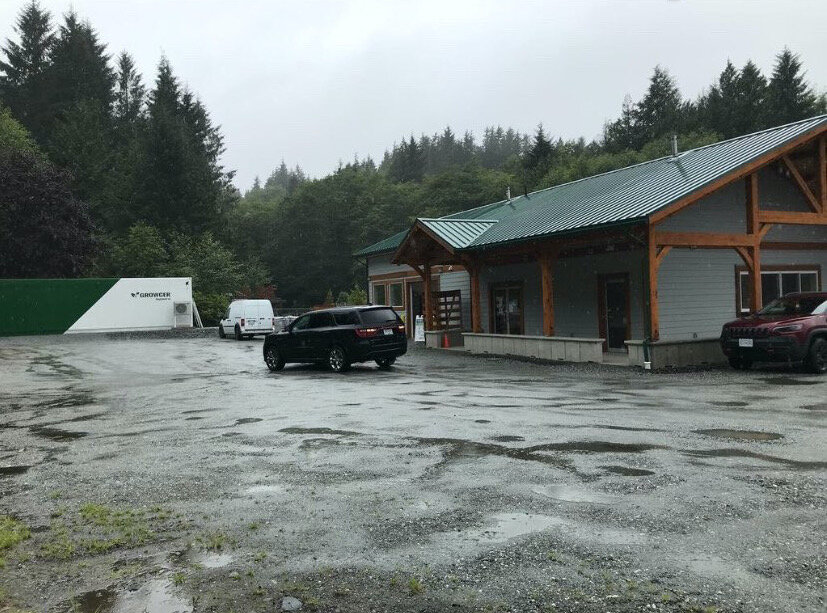Gitmaxmak’ay Nisga’a Society: Sustainable, efficient community solution for food security
A non-profit in one of the rainiest and cloudiest cities in Canada saw an opportunity to use indoor hydroponic farming when they couldn’t rely on traditional agriculture to increase food security.
The Gitmaxmak’ay Nisga’a Society (GNS) is a non-profit First Nations organization delivering programs and services to Nisga’a citizens in the Prince Rupert and Port Edward area on behalf of Nisga’a Lisims Government. The Gitmaxmak’ay Nisga’a Society aims to enhance the social, economic, physical, cultural, and spiritual well-being of its registered members living away from Nisga’a Lands.
Blair Mirau, the chief executive officer of Gitmaxmak’ay Nisga’a Society, shares the domino effect that led to investing in a Growcer farm.
Project at a Glance
- Installed in summer 2020 and located in Prince Rupert, British Columbia.
- Project goal: Grow produce year-round for Gitmaxmak'ay Nisga'a Society community members.
- Distribution model: Produce subscription for community members, with the profits being used to offset the costs of produce given to community members in need.
- Impact: All proceeds from the project are used for other programs in the community.
- Operator: One full-time operator managed by the non-profit.
Challenge - Improving quality of life for Nisga’a citizens
In 2013, the non-profit purchased a worn down garden centre with three traditional greenhouses but wasn’t sure what a food project could look like in the space.
“We’re the rainiest and cloudiest city in Canada, and it’s incredibly difficult to do traditional agriculture,” explained Blair Mirau, the chief executive officer of Gitmaxmak’ay Nisga’a Society, adding that there’s no agriculturally zoned land within 150 km.
Ultimately what moved food to the top of the priority list was a quality of life survey among Nisga’a citizens showing 1 in 3 households were not regularly eating three meals a day. The survey identified the availability and cost of food were barriers to food security, and action had to be taken.
Gitmaxmak’ay Nisga’a Society partnered with a local non-profit, Ecotrust Canada, to recruit masters students to test out possible solutions to address food insecurity. The pilot programs concluded there wasn’t enough space at the garden centre site to grow enough food to meet the high demand, and any community garden would require significant and ongoing subsidization. It wasn’t until Mirau saw Growcer on an episode of Dragons’ Den that he realized they could accomplish their goal in a different way.
“Everything clicked for me. I just thought, ‘wow this is incredibly space efficient, energy efficient, it can grow all year round regardless of weather conditions, and it can create jobs and supply food for the community,’” Mirau said.
“Everything clicked for me.
I just thought, ‘wow this is incredibly space efficient, energy efficient, it can grow all year round and it can create jobs and supply food for the community.”
Solution - Growing year-round with a hydroponic container farm
The Growcer’s plug-and-play 40-foot container farm overcomes a lack of space and allows Gitmaxmak’ay Nisga’a Society to grow 500 heads of fresh greens per week, unfazed by Prince Rupert’s rainiest weather.
The non-profit created a distribution model where community members pay to receive a subscription box of weekly produce and the profits from the subscription subsidize free produce boxes to members in need. Any additional revenue is reinvested into other community initiatives.
Since launching Gitmaxmak’ay Nisga’a Society’s Growcer farm in late 2020, the community response has been “overwhelmingly positive.” Based on community surveys, they grow buttercrunch and romaine lettuce, spinach, microgreens, and the herbs, basil and cilantro.
“We didn’t think we’d get more than 10-15 people in our Zoom consultations, but within 1 hour and a half of the presentation we had 110 on our interest list wanting a subscription box, willing to put a deposit down,” Mirau shared. “There’s a demand for local food in Prince Rupert that really has never been met.”
The subscription box is named “Yaga” which means “at the base of the mountain” in Nisga’a and refers to the location of the farm because it sits at the base of a mountain.
“We didn’t think we’d get more than 10-15 people in our Zoom consultations, but within 1 hour and a half of the presentation we had 110 on our interest list wanting a subscription box, willing to put a deposit down.”
“We can reasonably see a future where we can start to supplement the fresh greens subscription box, we can start to add on some of nature’s bounty from around our area, like salmon, halibut, and other types of seafood,” Mirau said. The plan is to scale the subscription box to get local food into as many local hands as possible. “We see the Growcer unit as being the foundation upon which we can build that infrastructure.”
Blair Mirau, the chief executive officer of Gitmaxmak’ay Nisga’a Society, shares the future of their Growcer project.
Results
-
The community of 1,600 members gains access to fresh leafy greens weekly, such as buttercrunch and romaine lettuce, bok choy, spinach, microgreens, and herbs, basil and cilantro.
-
Nutritious produce is available weekly at affordable prices, or donated freely to community members in need.
-
The adjacent cafe, currently under construction at the Seal Cove location of Rupert Lawn and Garden, and local fish and chips restaurant can source local produce.
-
Outside of GNS’s social enterprises, a couple local restaurants purchase the locally grown and sourced leafy greens.
“This hydroponics unit means Prince Rupert will finally have a local source for fresh vegetables and herbs. Furthermore, the hydroponics greenhouse will integrate perfectly with our portfolio of small businesses, create good quality jobs, and feed families.”
Going offline?
Download a PDF version of Gitmaxmak’ay Nisga’a Society’s case study below:



